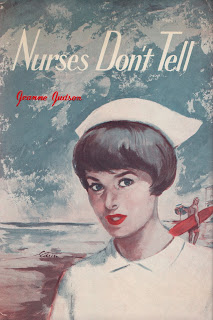Cover illustration by Edrien King
In a way, it was like a vacation—being nurse to wealthy and arthritic Mrs. Wendell at her luxurious estate, Idlerest, in the Florida Keys. Mrs. Wendell played bridge every afternoon, and when there was a fourth—and usually there was—Katrina was free to swim or do anything she liked. Still, it became a bit boring with no one around but middle-aged people. That was why Katrina welcomed the girl on the beach—a rather strange girl, with wide-set gray eyes and a disconcerting habit of saying exactly what she thought. Even before Katrina learned that Mary Cordell was under observation by a psychiatrist visiting at her uncle’s home, she had decided that Mary was “odd,” to say the least. But Mary’s brother was quite another story. Personable, wealthy, with a Government job in Washington, and a sense of humor as sharp as Katrina’s own, Martin Cordell was the answer to any maiden’s dream … When bronzed, athletic-looking Captain Paul Williams—Mrs. Wendell’s partner at bridge whenever she could snare him—began to show an interest in Mary, Katrina knew there would be trouble. Victor Brierly, Mary’s uncle and guardian, had no intention of relinquishing the reins to Mary’s fortune. The stage was set—with Katrina an unwitting participant in a drama worthy of the mysterious and often dangerous Keys. Setting out for an innocent game with Mary, Katrina found herself, instead, a prisoner on Paul Williams’ reconverted yacht, the Conch Shell. Katrina takes matters into her own hands in a night that threatens to end for her in the dark and menacing waters of the Gulf of Mexico.
GRADE: B
BEST QUOTES:
“When we were first married I made it my rule that he
shouldn’t have a single interest that I didn’t share.”
“Everything dangerous is fascinating.”
“A broken heart was a splendid basis on which to build a successful and useful life.”
“I think that’s the hardest thing I have to bear—my ankles.”
REVIEW
“Even beauty can grow monotonous,” fibs Nurse Katrina
Bright, who has been hired by wealthy widow Sylvia Wendell to accompany her to the
Florida Keys, where she oversees pool exercises, gives backrubs, and dispenses
pills to manage arthritis of the hip. The rest of the time is hers to lounge on
the beach—though admittedly sometimes she is forced to make the fourth at the
bridge table.
She is getting a little bored when she meets Mary Cordell, a wealthy 20-year-old who is equally lonely and also somewhat peculiar; her guardian is attempting to have her declared mentally incompetent before her 21st birthday so he can continue to control her money—but he’s richer than she is, so it’s not clear why he wants it. Mary’s brother Martin is 28, and he’s visiting from Washington, DC, where he works as an ichthyologist, though exactly what he does is never exactly explained, Katrina soon finds herself falling for Martin—and before the book is half over, they declare their love for each other in a scene that is, unfortunately, uninspired.
The problem of the story is that Mary has decided that she is going to marry Capt. Paul Williams, who is 18 years her senior and a retired Navy man. Katrina discovers that Paul is smuggling people (including the brother of Mercedes Delgado, whom we met in Jeanne Judson’s book City Nurse) and likely weapons as well in and out of Cuba, but she doesn’t feel that it’s her place to fill anyone in on Paul’s extracurriculars, because, well, nurses don’t tell. “If Mary wanted Martin to know, she would tell him herself,” she thinks—and Mary does not, even asking Katrina not to spill the beans. Katrina is waiting until her 21st birthday, when she inherits her money and has legal rights, to elope—and the day before her birthday, Mary asks Katrina to go for a ride on Paul’s boat with her. Katrina agrees, but then it turns out that she’s being essentially kidnapped, to join the pair on an overnight trip for the elopement so she won’t be able to tell anyone of Mary and Paul’s plans. It’s a rather strange explanation for committing a felony, with apparently no one, not even the victim, considering that jail time could result. Rather, Katrina is upset entirely because she will not be able to report back for duty at 5 pm, when Mrs. Wendell expects her. When the adventure is finally over, the only person who ends up badly is Katrina, who is fired from her job and has the de rigueur misunderstanding with her beloved that appears to end their relationship.
The story does include some pretty descriptions of the Florida Keys, but this is the only part of the book that seems to interest the author much. Jeanne Judson is very good at describing a house full of rich people and their interactions, but since the reader doesn’t really have any investment in these characters, it feels more like an anthropological study. The only exciting part of the story is Katrina’s abduction, but the lack of repercussions are bewildering. Overall this book has some interest, but not enough spark or attention from the author to make it really good. Knowing what Jeanne Judson is capable of—see City Nurse, Visiting Nurse, and Small Town Nurse—this book is a disappointment, even if it isn’t half bad.




